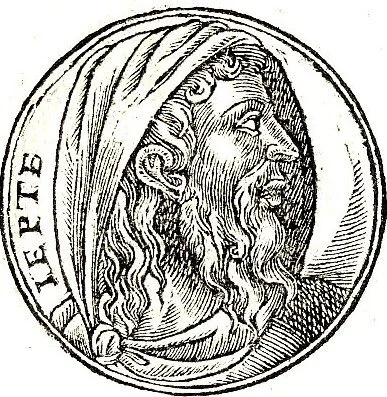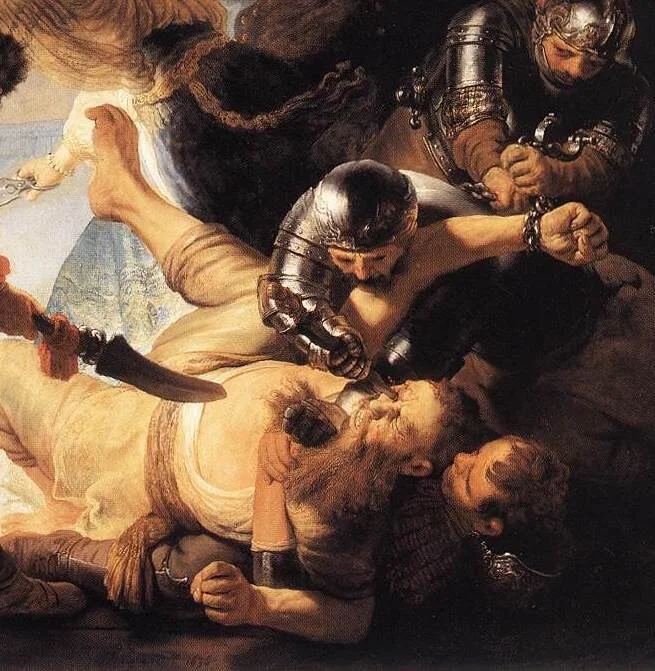Lent Series: Judges -- Jepthath
In this fifth post of our Lent series on the Book of Judges, Fr Jarred thinks through what Jepthath's story tells us about about power and the control we desire and have over our own lives.
Judges 11.20-40
This is a hard text. Jephthah was an illegitimate child of Gilead, and ostracised from his family and lived away from the people. But he was a valiant warrior, and Israel was in trouble. So the elders of Gilead went to Jephthah and asked him to lead them. He does so reluctantly, and leads Israel into battle against the Ammonites who were coming against them. Going into battle, he makes a vow to God that if he has victory and returns safely home the first thing that comes out of his house he will consecrate to God and make of it a burnt offering. Then, inevitably his young daughter comes dancing out of the house on his arrival. She submits, and he sees his vow to God as binding over the life of his daughter.
Never did it occur to him, of course, that he might have just had more warriors or a better army or been a better group of fighters than the Ammonites. God gave victory, and God wanted payment, so Jephthah is convinced.
The obvious problem here is that child sacrifice is condemned in God's law (Lev 20.2; Deut 18.10). Molech is the kind of god that demands burnt offerings of children, Yahweh condemns it. But Jephthah, made judge of the people due to his military prowess and not his knowledge and commitment to God's law, clearly did not know this.
God had shown that he is not a god like others, he is not a god at all, when he provides a substitute for Isaac when Abraham drew near to such a heinous act. Jephthah shouldn't need a ram or an ox to show up in the bushes, he is a judge of God's people and should know the law. This is not of God.
Many of the Rabbis later ridicule him for being ignorant of the law and for not seeking council from the high priest Phinehas. And they say both were punished, Jephthah for his abominable breaking of the law and his pride in not seeking council, and Phinehas for his own hubris in not intervening without being asked. Indeed, as the biblical text says that Jephthah's body was buried in the 'cities', plural, of Gilead (12.7), some Rabbis say this means he was afflicted with boils and dismemberment.
This is, at least, one interpretation. The other is that there was no sacrifice at all. Jephthah's vow was not to sacrifice his daughter, but to consecrate her to the Lord as a virgin servant of the temple, and he is sorrowful because she is his only child and this will end his line. Jephthah begins his life as an illegitimate child with claim to nothing, and ends his life leaving nothing behind, no lineage, no glory.
Jephthah's daughter then goes into a life dedicated to God's service, and the daughters of Israel went to her year by year as a sort of pilgrimage to a virgin saint.
Some Christian commentators go with this reading as well. Others argue that Jephthah did sacrifice his daughter and was a righteous man for doing so, staying true to his vow to the Lord and realising that keeping his vow was more important than the life of his daughter - These interpreters are idiots!
In either of the non-idiotic interpretations, the ones we find among the Rabbis, Jephthah's daughter is an exemplary model of humility, grace, and power, and Jephthah is an ignorant buffoon - a man of the utmost brute strength, who is weak, made powerless.
In either interpretation, Jephthah is unwilling to let go, to surrender, his false view of God as a god. God as an object, to be used for our own gain, to further our own agenda, a god who enables us to live more and more as the centre of our own story. And it costed him, greatly. It costs us greatly, too.
Lent is not a season where we punish ourselves for being human. Wallow in our sin and shame - this is just more 'me', more narcissism, more me at the centre of things. Lent is rather a season of letting ourselves, and sometimes our god, go. It is a time of dispossession, which trains us for a life of dispossession.
Jephthah's god was an instrument, an arbitrary vessel for him to wield for the furtherance of himself. His god was something he possessed.
In Lent, as we move towards Christ's passion and the new life of the Easter mystery, we must let go of the false security that we place in our own power, in the sense of control we have over our own lives, and we must also let go of our false vision of God: the god who exists to further the reach of our own power, to secure the sense of control we have over our own lives. We must lose the false god we posses, if we are to find ourselves caught up in the life of the true God, that infinite and undying Love, that possesses us.




